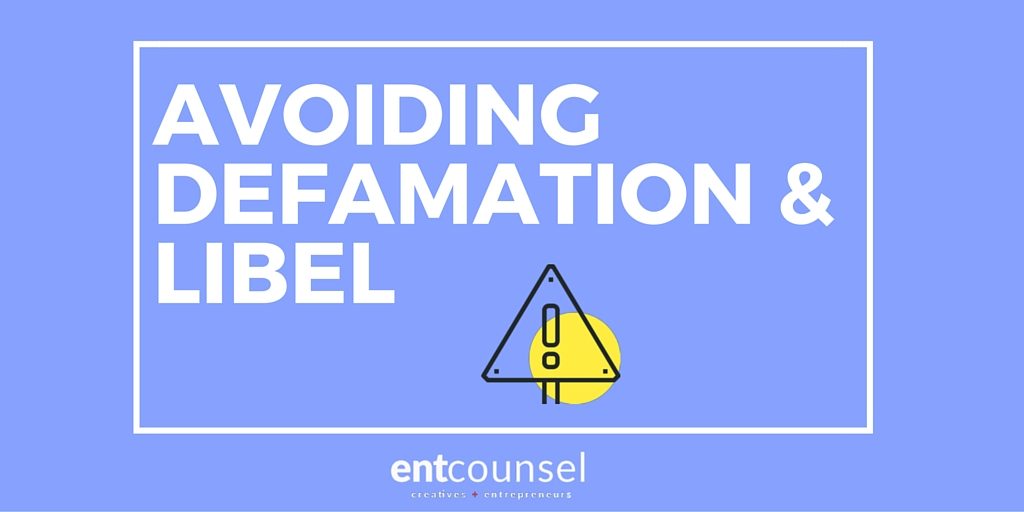It is important for a journalist to know the elements of defamation. Defamation and libel are concerns that journalists have when reporting on contentious and controversial issues.
Having worked for various broadcasters over the years, journalists have a lot of questions about what they can or cannot report. The following is a hot list of tips to help you avoid defamatory statements that will get you into trouble when reporting.
Elements of Defamation and Defences
First, it’s important to understand the difference between defamation and contempt of court when reporting a story.
Defamation is defined as a statement that tends to discredit or lower the reputation of another individual usually by a statement made by another person that is not true or covered under another defence. The elements of defamation are discussed below.
Contempt is conduct which undermines or brings into disrepute the authority and administration of justice. Contempt of court means the interference of someone rights to a fair hearing before a court or quasi-judicial body. Contempt of court can include:
- disobeying court orders
- disrupting a hearing
- publishing damaging information about someone involved in a trial
The Supreme Court of Canada decision in Grant v. TORSTAR CORP. outlined the elements of defamation at paras 28-37 that a plaintiff is required to provide as outlined below. The quotes below are all taken from this case.
1) “that the impugned words were defamatory, in the sense that they would tend to lower the plaintiff’s reputation in the eyes of a reasonable person”;
2) “that the words in fact referred to the plaintiff”; and
3) “that the words were published, meaning that they were communicated to at least one person other than the plaintiff”.
If a plaintiff can prove the above elements of defamation, the onus is on the defendant to put forward a defence.
Defences to Defamation
Even if you prove the elements of defamation, a defendant may still be able to raise one of the following defences:
1) Defence of Privilege (Absolute and Qualified Privilege)
A statement of opinion includes any “deduction, inference, conclusion, criticism, judgment, remark or observation which is generally incapable or proof” (Ross v. New Brunswick Teachers’ Assn., 2001 NBCA 62, 201 D.L.R. (4th) 75, at para 56 cited in WIC Radio, at para. 26).
Statements of opinion and statements of facts may fall under the defence of privilege under certain circumstances. These include:
- Parliamentary and legal proceedings are absolutely privileged.
- Qualified privilege means that the privilege can be defeated by proof that the defendant acted with malic such as in reference letters or credit reports. See para 35 of GRANT v. TORSTAR CORP.]
[35] In recent decades, courts have begun to moderate the strictures of qualified privilege, albeit in an ad hoc and incremental way. When a strong duty and interest seemed to warrant it, they have on occasion applied the privilege to publications to the world at large. For example, in suits against politicians expressing concerns to the electorate about the conduct of other public figures, courts have sometimes recognized that a politician’s “duty to ventilate” matters of concern to the public could give rise to qualified privilege: Parlett v. Robinson (1986), 5 B.C.L.R. (2d) 26 (C.A.), at p. 39.
[36] In the last decade, this recognition has sometimes been extended to media defendants. For example, in Grenier v. Southam Inc., [1997] O.J. No. 2193 (QL), the Ontario Court of Appeal (in a brief endorsement) upheld a trial judge’s finding that the defendant media corporation had a “social and moral duty” to publish the article in question. Other cases have adopted the view that qualified privilege is available to media defendants, provided that they can show a social or moral duty to publish the information and a corresponding public interest in receiving it: Leenen v. Canadian Broadcasting Corp. (2000), 48 O.R. (3d) 656 (S.C.J.), at p. 695, aff’d (2001), 54 O.R. (3d) 612 (C.A.), and Young v. Toronto Star Newspapers Ltd. (2003), 66 O.R. (3d) 170 (S.C.J.), aff’d (2005), 77 O.R. (3d) 680 (C.A.).
[37] Despite these tentative forays, the threshold for privilege remains high and the criteria for reciprocal duty and interest required to establish it unclear. It remains uncertain when, if ever, a media outlet can avail itself of the defence of qualified privilege.
2) Defence of Fair Comment
The defence of fair comment has to satisfy the following test for the elements of defamation:
(a) the comment must be on a matter of public interest;
(b) the comment must be based on fact;
(c) the comment, though it can include inferences of fact, must be recognisable as comment;
(d) the comment must satisfy the following objective test: could any person honestly express that opinion on the proved facts?; and
(e) even though the comment satisfies the objective test the defence can be defeated if the plaintiff proves that the defendant was actuated by express malice.
The SCC notes that the comment must be one that “anyone could honestly have expressed” .
3) Defence that a Statement is Substantially True
If the elements of defamation are proven but the statement is substantially true, then a defendant has a defence to defamation by raising the defence that the statement is substantially true.
4) Defence that a Statement was Made in a Protected Context (Privilege) (see para 34 of GRANT v TORSTAR CORP.)
[34] If the defence of justification fails, generally the only way a publisher can escape liability for an untrue defamatory statement of fact is by establishing that the statement was made on a privileged occasion. However, the defence of qualified privilege has seldom assisted media organizations. One reason is that qualified privilege has traditionally been grounded in special relationships characterized by a “duty” to communicate the information and a reciprocal “interest” in receiving it. The press communicates information not to identified individuals with whom it has a personal relationship, but to the public at large. Another reason is the conservative stance of early decisions, which struck a balance that preferred reputation over freedom of expression. In a series of judgments written by Cartwright J. (as he then was), this Court refused to grant the communications media any special status that might have afforded them greater access to the privilege: Douglas v. Tucker, [1952] 1 S.C.R. 275; Globe and Mail Ltd. v. Boland, [1960] S.C.R. 203; Banks v. Globe and Mail Ltd., [1961] S.C.R. 474; Jones v. Bennett, [1969] S.C.R. 277.
5) Defence of Justification
To succeed on the defence of justification, a defendant must adduce evidence showing that the statement was substantially true. This may be difficult to do. A journalist who has checked sources and is satisfied that a statement is substantially true may nevertheless have difficulty proving this in court, perhaps years after the event. The practical result of the gap between responsible verification and the ability to prove truth in a court of law on some date far in the future, is that the defence of justification is often of little utility to journalists and those who publish their stories.
Other helpful cases include:
Leenan v. Canadian Broadcasting Corp., 2001 CanLII 4997 (ON C.A.)
Hodgson v. Canadian Newspapers Co. Ltd., 2000 CanLII 14715 (ON C.A.)
Hill v. Church of Scientology of Toronto, 1993 CanLII 1348 (S.C.C.)
Tips for Journalists to Avoid a Defamation Action
The following are some tips to watch out for to avoid a defamation lawsuit
- Reporting Criminal Charges. A journalist should be careful not to suggest a person is guilty of a crime when charges have only been laid and the accused has not been found guilty by a court of law. Use the exact wording of the charge and identify the accused with their full name and address. It’s important to note that when reporting criminal charges, to be careful not to suggest or indicate guilt of the accused prior to any final verdict being rendered. It is important to be clear if a defendant is only “alleged” to have committed a crime and to be clear and use the words “alleged”.
- Use of Stock Footage. In addition to obtaining clearance for the stock footage, be careful about using old footage and showing individuals in a video portraying a certain image of them that is in not fact true or would tend to be defamatory. Eg. Showing stock footage of crowds indicating to show a protest when in fact those individuals were not at the protest.
- Reporting Criminal Records. Do not report previous charges once new charges are laid for an offence. It would be considered a contempt of court to report his criminal record or other matters before a previous charge is adjudicated in court. The closer the accused it to a trial, the more a journalist is in danger of contempt of court. It’s important to be careful when interviewing witnesses before trial.
- Reporting Pleadings. the publication and broadcast of pleadings are permitted and protected by a qualified privilege. There should be no malice involved in reporting pleadings. It’s important to use the actual language contained in the pleadings if taking out excerpts and it’s prudent to also report pleadings from the other party as well.
- News Headlines. Be careful not to sensationalize or exaggerate headlines. The headlines should be supported by true facts. For example, a suspension or ban on an individual may be limited by position or a term. If the restrictions are not mentioned, the headline could be considered untrue and misleading.
- Defamatory On-Air/Live Statements – A broadcaster is responsible for statements made by guests on air. It’s important to prepare guests before they are interviewed. Ensure there is a way to edit out any controversial material.
- Reporting from Police Reports. A reporter should be careful about reporting police comments and information contained in official police reports. The facts and information contained in an official police report are protected by privilege whereas police comments are not. The defence of privilege applies to “official reports, bulletins, notices or other documents issued by a public officer for the information of the public.” Therefore, it’s important to use the language in the official police report, bulletins etc. Any other comments by police officers should be made clear that an investigation is ongoing.
- Public Figures – While the press often comments on the public acts of public figures as we have seen with Former Mayor Rob Ford. It’s important to treat their private life much more carefully and to not delve into private affairs especially those that do not impact their public office.
- Defamatory Statements by Third Parties – If a third party makes a defamatory statement and you report it as “as reported by XYZ media” will not protect you from the defamatory comment. It’s important to note that the use of words “alleged”, “it is claimed” or “reportedly” offer no protection in a defamation action.
- Investigative Reporting. It’s important to be absolutely truthful in reporting and check all facts carefully and diligently. It’s important, to be honest, fair and ethical when investigating and reporting stories. A journalist should avoid sensationalizing a story and/or ambushing interviewees. Always research stories before reporting and take the time to get all your facts first.
The above is not intended as legal advice and we recommend that you seek legal counsel.



